The guide to owning a Border Collie.
Want to know everything there is to know about finding the right dog for you? Submit your email below, and we’ll send you a one-stop guide to help you on your pet-ownership journey.
Jump to:
Stats at a glance.
History of the Border Collie.
Let's start by looking at the history of this fascinating dog breed. Many believe these champion herding dogs can trace their lineage back to a single ancestor named Old Hemp.
Over a century ago, he became a popular stud dog due to his calm, reliable herding style. With a blend of Celtic and Viking stock, the breed of dog that became the Border Collie flourished in the border regions between Scotland and England.
The pairing of sharp intelligence and tireless stamina made them prized by local shepherd communities.
Later, people took notice of their brilliance in both the show ring and international sheep dog society events, admiring how they respond closely to the slightest handler signals.
If you’re curious about more unique or lesser-known breeds, pop over to our “Discovering The Top Ten Rarest Dog Breeds” article for a fun read.


How much is a Border Collie puppy (UK)?
Because Border Collies are one of the most popular working companions, you’ll find a range of prices. Expect to pay between £400 and £2,000 for a Border Collie pup, depending on pedigree, coat pattern (such as merle or blue merle), and breed standard lineage.
As always, be suspicious of offers that seem too good to be true. You want to ensure the pup has come from a responsible setting, not through questionable routes.
If you’re a first-time dog owner, be sure to skim our essential guide to buying a puppy. It covers the dos and don’ts of puppy selection, including tips on health issues which could help you with lineage and any known problems found in Border Collies (e.g., tns, mdr1, or ceroid lipofuscinosis).
Colours and coat types.
When it comes to variety, Border Collie dogs are real show-stoppers. Common colours include the classic black and white, tricolour, blue merle, and red merle.
Some are predominantly white, though careful breeding guidelines prevent excessively white pups from developing health issues.
They have a double coat, which can be either rough (longer hairs) or smooth (shorter hairs). Both coat types are weather-resistant, reflecting their history as working dog companions in the often wet and windy farmland.





Size and weight.
Border Collies need enough bone and muscle to herd sheep all day. Males usually measure around 48–56cm at the shoulder, with females just a touch smaller.
Weights typically fall between 13–20 kg. They’re medium-sized dogs who can squeeze into a car for an adventure, but are agile enough to outrun half the field in a sheepdog trial, or just on walkies.
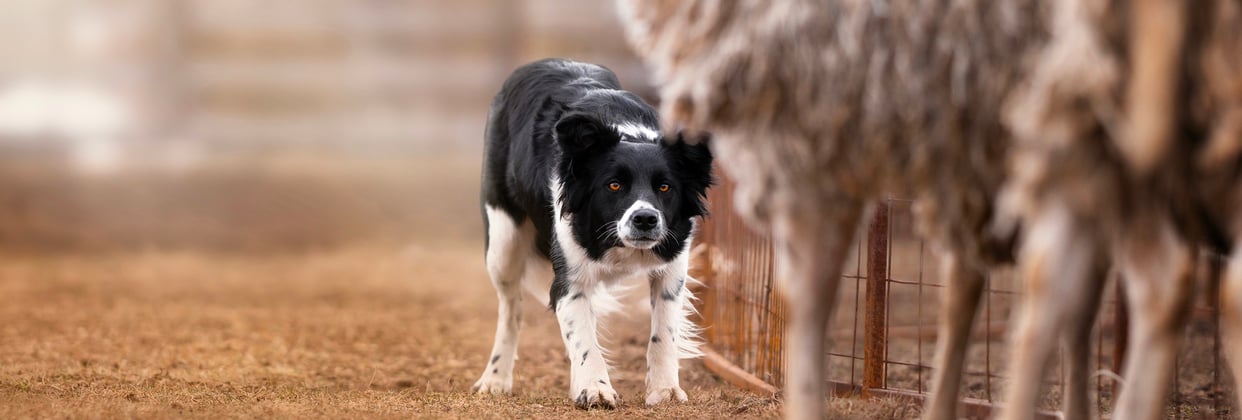

Temperament and behaviour.
Temperament
The intelligence of the Border Collie is famous. The American Border Collie Association (ABCA) calls them an intelligent breed built to think independently during herding.
That’s fantastic when you’re on the farm, but it also means a Border Collie might decide on their own activities if left bored.
They can become fixated on moving objects (like children, bikes, or other pets) because they’re still keen to fulfil that sheepdog instinct.
Do Border Collies make good pets?
They can be amazing pets if you have time and energy. Border Collies are one of the best marathon training partners—whether it’s mental puzzle sessions or actual jogging.
They do well in active households that love playing games or trying dog sports like flyball or agility training. If you need a calmer dog for a less busy home, a collie may not be the top fit.
Are Border Collies good with kids?
Yes, though always supervise. Because they’re herding dogs, some collies might “herd” toddlers or older children. Gentle training helps them see kids as part of the family, not stray sheep.
Also, teach children proper dog-handling skills by making sure they are soft and gentle when they are pups, yet still remaining fun and active with their new best friend.
Are Border Collies good with cats?
Some Border Collies may also do just fine with cats, particularly if they’re introduced young. Others might be intense or chase-oriented, so it depends on the individual dog.
A calm environment and controlled introductions can help, but you’ll want to watch for signs of aggression or stress in both animals.
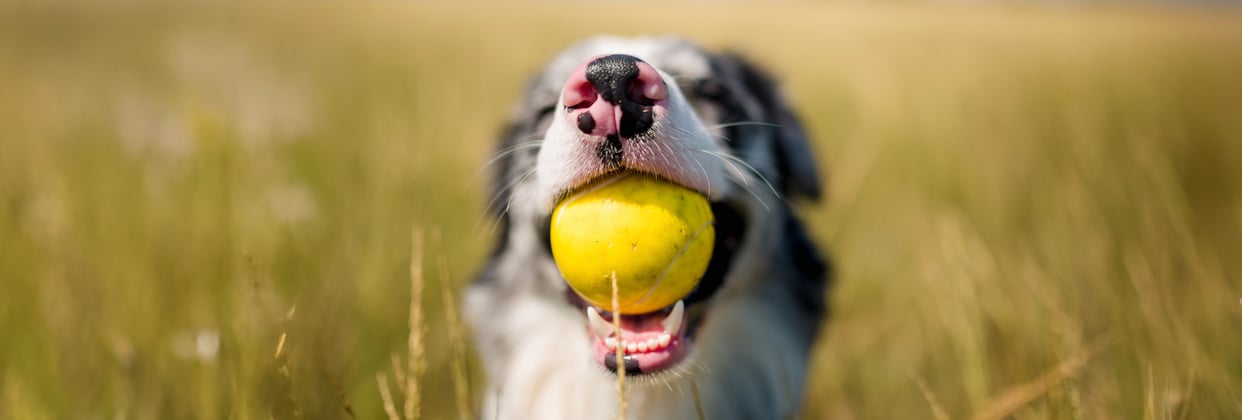

Behaviour
Border Collies thrive when given structure. Without guidance, they might bark, chew, or chase. If you’re worried about separation anxiety, check out our separation anxiety guide.
They form strong bonds with the household, so plan for exercise and mental enrichment to reduce negative behaviours.
Do Border Collies bark a lot?
Let’s just say… they aren’t known for being quiet housemates. Border Collies are clever, alert, and full of energy—traits that often come with a voice.
Whether they’re excited, frustrated, or trying to let you know someone’s walked past the window (again), they aren’t shy about speaking up.
Of course, not every Collie is a chatterbox, but without enough mental and physical stimulation, barking can quickly become their go-to activity.
The good news? With proper training and keeping their brain busy, you can usually teach them when enough is enough.
Are Border Collies good apartment dogs?
In short—only if you’re fully prepared to meet their needs. Border Collies might fit in size-wise, but their energy and brainpower are another story.
These dogs live for activity, whether that’s running, learning tricks, or working on a job. In a small apartment with nothing to do? Trouble.
They’re likely to develop unwanted habits like barking, chewing, or pacing. But if you’re an active person who can commit to daily exercise, brain games, and training, it’s possible—though they’ll always prefer life with a bit more space to roam.
Training a Border Collie.
Are Border Collies smart?
Absolutely. Many experts agree that these dogs are the “top dog” for intelligence. Their problem-solving skills are extraordinary, which can be a double-edged sword.
If you’re not prepared to keep them mentally engaged, they’ll get creative—sometimes in ways you won’t love.
Dog training tips
Dog training for a Border Collie should start from puppyhood. Early exposure to noises, new people, and other pets ensures they adapt well and aren’t fearful. Use positive reinforcement.
Because they love working with a handler, they respond quickly to treat-based rewards or enthusiastic praise.
Just remember that a bored collie can become destructive, so short, fun sessions are best.
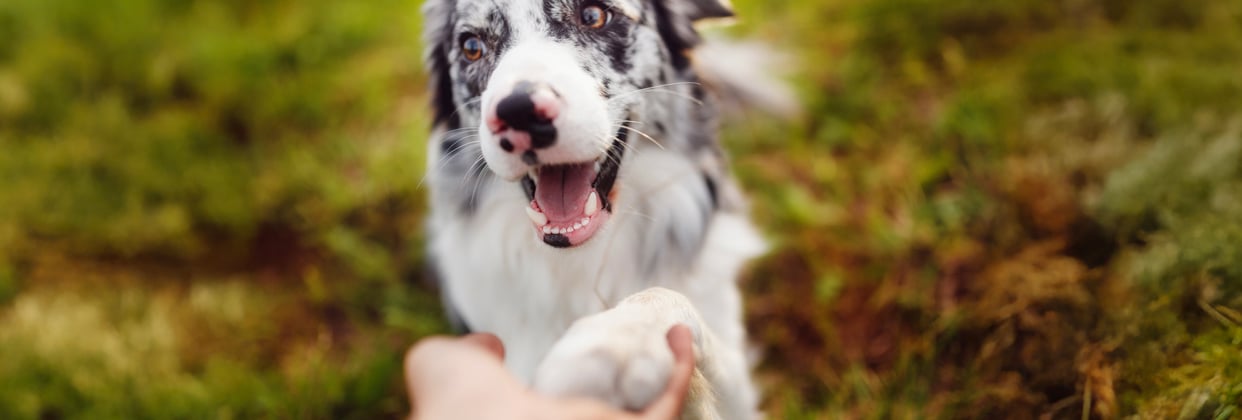

Shedding and grooming.
Double coat maintenance
Because they have a double coat, regular brushing is key. Aim for a minimum of two sessions a week to eliminate loose fur and tangles.
During moulting seasons, which can occur a couple of times a year, daily brushing helps control the fur explosion.
Merle or solid colours, the process is fairly similar—use a slicker brush or comb to reach down to the undercoat.
Occasional baths are fine, but don’t overdo it. If you need more grooming tips, especially for dogs with sensitive skin, we’ve got you covered in our dog shampoos for itchy skin post.
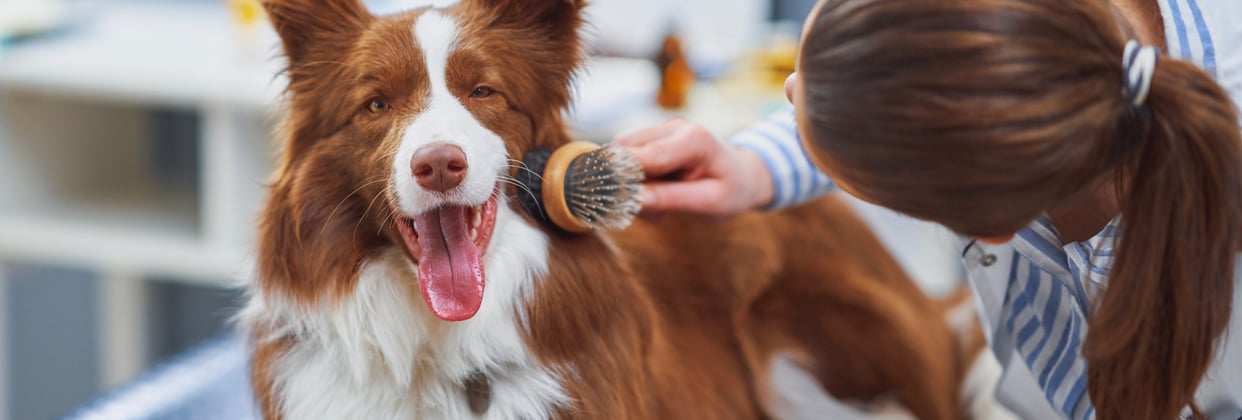

Exercise and mental stimulation.
Border Collies need heavy doses of both physical exercise and mental challenges. Try a 60–120-minute plan each day, mixing fetch, jogging, or advanced trick training.
They excel at agility and flyball because they love the chase and the problem-solving aspects.
Activities to avoid
It’s best to skip purely repetitive tasks like having them chase laser pointers without an off switch.
They can become obsessed and frustrated.
Instead, engage with puzzle toys or nose-work games. For more creative suggestions, check out our "How To Make Your Dog Happy" piece.
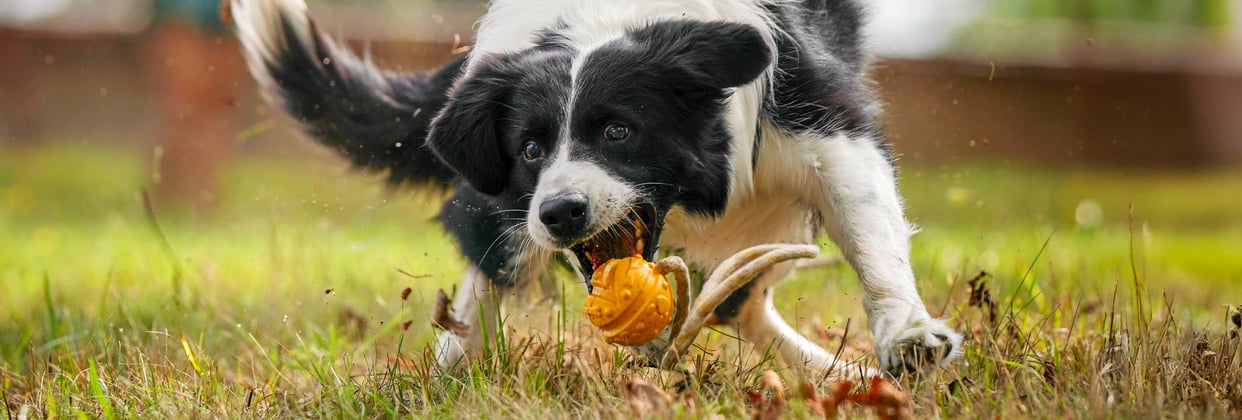

Feeding and nutrition.
A Border Collie is a working dog at heart, so they often need a nutrient-rich diet. Most adult collies eat about 1.5–2.5 cups of quality dog food daily, split into two meals. Each individual dog might differ depending on exercise level and age. Keep portion sizes in check to avoid obesity.
If you’re unsure where to start, consider a chat with your veterinary professional or see our grain-free dog food guide for more balanced feeding insights.
Common health issues in Border Collies.
Border Collie health concerns can include:
Regular vet appointments and genetic screening are crucial. Prompt action can prevent small issues from blooming into bigger problems.


Pet insurance for Border Collies.
Given their energetic lifestyle and the possibility of inherited conditions, comprehensive coverage can be a huge relief. Treating hip dysplasia or advanced eye procedures can become pricey. At Waggel, we offer lifetime policies tailored to breed-specific needs, along with 24/7 vet triage via Joii.
You can get your free quote and join our community of protected pets. After all, dogs are wonderful, especially when they’re bounding around worry-free.


